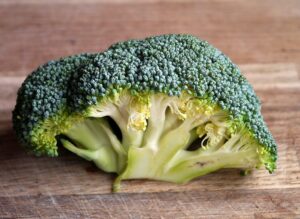Eating Broccoli: Daily Value Nutrients in Cruciferous Vegetables

As a child, I used to hate broccoli. As a matter of fact, I used to detest eating any vegetables and dinner time was always a huge hassle for my mother (and everyone else at the dinner table). I would argue and push my veggies around my plate hoping that they would disappear if I concentrated hard enough. But they never did and I always wound up forking them down, disillusioned and disappointed. When I look back now, I find it hard to believe that I was ever like that. Nowadays I’m the one recommending veggies, fruits and dishes to my friends as a way of keeping healthy. I suppose life isn’t without its ironies!
Strangely enough though, the one vegetable I did eat as a child (and still love to this day) was broccoli. I always liked to imagine the florets as being like little trees, and I would playfully position pieces of whatever else was on my plate and pretended that I was eating a forest – strange little Proustian flashback there.
As I grew up, I became more interested in finding out more about food and what made certain foods healthy or unhealthy as well as how to lead a healthy and balanced life. Broccoli kept raising the bar in terms of what I came to expect from my diet and has continually amazed me both in terms of its health benefits and the amazing things you can do with it in the kitchen.
In an age where a healthy lifestyle and diet are becoming more and more of a central issue in our society, understanding what to eat and how to eat it provides you with more benefits than you realize. In recent times, more and more emphasis is being placed on the importance of living a life that is closer to nature. This has come about largely as a reaction to the often toxic or potentially harmful nature of many of the conventional forms of medication that we’re taking today.
While modern medicine is very effective at isolating and treating the symptoms of almost any disease, the truth of the matter is that most forms of modern medicine come with long lists of side effects. these can have negative effects on the quality of our health, not to mention bring about other health ailments for which we need a separate medication to treat. It’s a vicious cycle of sorts.
So in taking a step back and trying to identify the various factors in our lives that actually lead to these diseases, we have started adapting to a more holistic approach to medicine – at least those of us who are health conscious or wary of pharmaceutical treatments.
Everyone would agree that prevention is better than the cure. Following a healthy diet as well as getting enough regular exercise have proven to be highly effective at preventing the formation of a great deal of health ailments whilst promoting a healthier state of being overall. In selecting your edible arsenal to help combat the rise of infections, illness and disease, broccoli is an invaluable asset and one you cannot afford to ignore. After reading this article I hope that you’ll be inspired to eat as much broccoli as you can.
What Is Broccoli? Where Does It Come From?

Broccoli started out as a form of wild cabbage
Like most cruciferous vegetables, broccoli occurs naturally on almost every continent on the planet and has been cultivated by man for centuries. In fact, the broccoli we know today has only occurred as result of continuous selective planting and agricultural practices and it originally started out as a form of wild cabbage.
The term ‘cruciferae’ in latin directly translates to ‘cross-bearing’ and is used to describe the shape of the leaves of these vegetables. Broccoli is directly linked to vegetables such as Brussels sprouts, cabbage, cauliflower, collards, kale as well as mustard greens and turnip greens. They are often grouped together in terms of global analyses of imports and exports and can often be utilized in similar ways dietarily.
Because of the fact that the vegetable occurs naturally on most continents in the world, it has been used in a variety of different dishes and prepared in many different ways over the course of history which means there are a lot of options available to you in terms of how you prepare broccoli. It has come to form an important part of cuisine in many cultures due to its immensely beneficial health benefits and distinctive taste and texture.
Read about Oatmeal and Teff Flour Health Benefits!
Nutrients Found In Broccoli
Besides being a really delicious snack, broccoli packs a heavy punch when it comes to its nutritional profile. In fact, when broccoli is prepared correctly and consumed in the right amounts it can easily hold its own against a conventional multi-vitamin supplement and provides health benefits far beyond the costly multi-vitamins that flood the market in the modern era.
In terms of vitamin content, broccoli is a good source of vitamin C, K, B6, E, B1 and A due to the high amount of carotenoids that occur within the vegetable which makes it ideal for treating skin, hair, eyes, bone development and can even help to slow the signs of aging when used in conjunction with a balanced diet and the right precautions, a regular beauty routine and enough exercise (sweat those toxins out!).
Besides the vitamin content, broccoli is also a rich source of minerals, including chromium, folate, pantothenic acid, manganese, phosphorus, choline, potassium, copper, magnesium, zinc, calcium, iron, niacin and selenium! If that isn’t on par with a multivitamin – then I don’t know what is. I almost forgot to mention that broccoli is an excellent source of protein and dietary fiber and contains a notable amount of omega-3 fatty acids. If you’re not eating broccoli on a regular basis then you’re definitely missing out on a world of healthy healing and tasty dishes.
Broccoli As An Anti-Inflammatory Measure

The isothiocyanates contained in broccoli help reduce inflammation.
As I mentioned briefly in the previous section, there are a lot of variables that may affect the levels of inflammation in our bodies, some of which are more manageable than others. Keeping inflammation in check is very important for living a healthy life and preventing the development of various diseases and health ailments – some of which can be seriously life-threatening.
Inflammation occurs in two forms, namely acute and chronic inflammation. Acute inflammation is the kind that most of us are familiar with and occurs as the result of a cut, wound, scrape or bump. This form of inflammation is likely to fade in a short period of time and is easily treatable. However, chronic inflammation is a more serious matter and often requires the use of various forms of treatment in order to keep it in check or reduce the effects that the inflammation may have on your system.
Chronic inflammation has been linked to conditions such as osteoarthritis, lupus, rheumatoid arthritis, allergies, asthma and Crohn’s disease amongst others and you should always consult a doctor or experienced medical professional if you suffer from any of these disorders. Chronic inflammation can lead to more serious health issues such as heart disease, depression and even anger disorders.
Inflammation has also been linked to dietary habits and eating certain foods (like fried red meat for instance) on a regular basis can cause internal inflammation or at least promote the circumstances for inflammation.
When we are experiencing inflammation in any sense, our body releases a molecule known as Nf-kappa B as a means of treating the inflammation. However, when this molecule is released consistently over an indefinite or long period of time, it can wreak havoc on our bodies hormonal balance and has been linked to the development of serious health ailments. As mentioned previously, Nf-kappa B can be suppressed by the isothiocyanates which are made of the various glucosinolates that occur in broccoli.
By suppressing the Nf-kappa B pathways in your brain, you can greatly reduce the chances of developing serious health ailments. The rich antioxidant content found in broccoli also helps to prepare toxins for excretion which also helps to reduce the effects on inflammation in the body. I would recommend using a balanced diet (with lots of broccoli and cruciferous vegetables in the mix) as well as essential oils to help control and reduce the harmful effects of inflammation in the body. The natural option is often as effective as the pharmaceutical alternatives and can promote a healthier state of being in general rather than polluting your body with additional side-effects.
Broccoli For Digestion And Cardiovascular Health
A lot of health issues can actually be linked directly to our digestive systems and how well they operate and the key to ensuring that our digestive tracts are in healthy, working condition is highly dependent on the amount of fiber that is contained in our diet. Broccoli is a good source of fiber and can help to allow for a healthy digestive process as well as regulating your body’s ability to deal with inflammation due to the increase in glucosinolates.
On average, we should be eating roughly 2000 calories a week in order to get enough energy to function properly. When you consider that by eating 100 calories of broccoli (or 5% of a 2000 calorie diet), you get roughly 10 grams of fiber or 40% of the Daily Value – the recommended amount of fiber you need on a daily basis for a functioning and healthy digestive system, you are actually getting quite a lot from a single helping of broccoli which makes it a lot easier to meet your Daily Value in a healthy and balanced way.
The glucosinolate content in broccoli is also incredibly helpful in promoting a healthy and functioning digestive tract as they are converted into isothiocyanates in our body and ultimately help to protect the health of our stomach lining and prevent the growth of harmful bacteria that can lead to infection.
However, the benefits of broccoli’s fiber content don’t end with promoting a healthy digestive tract – they have various health benefits for your body overall. One such issue that broccoli can help with is promoting good cardiovascular health. If you don’t follow a particularly healthy diet, and are prone to eating fatty, oily or processed foods on a regular basis, you’re likely to have a build up of Low Density Lipoprotein in your system. This is known as bad cholesterol as it can lead to the calcification or blockage of the veins and ultimately lowers blood pressure or can cause the formation of blood clots which can wreak havoc on your heart or system in general.
Did you know? Broccoli provides almost 4 grams of protein per cup! #nutrition #broccoli pic.twitter.com/HW9KjWlxZ4
— Life Extension (@LifeExtension) October 14, 2017
Good cholesterol does the opposite of this and helps to ease the flow of blood in your body and keeps your heart in good, functioning condition – it’s like the lubrication in a car’s engine. However, once you have a high LDL count (and possibly all of the symptoms that come as a result of this such as diabetes, obesity and low blood pressure), there are a few ways that you can balance your body out again.
The dietary fiber in broccoli helps to bond with the LDL and collects all the bad cholesterol making them ready for excretion and ultimately balancing out your cholesterol levels again – although it’s important that you stay in touch with a doctor over this period for consistent monitoring. I’ve read many cases of people switching to whole food, plant based diets as a means of treating their cholesterol to great effect and broccoli is a highly effective tool in the process.
How to Get Your Kids To Eat Broccoli

A Picky Eater.
As I mentioned right in the opening paragraph, I too was a picky eater at one point so I can sympathize with young parents who are trying to feed their children healthy food – and it can be struggle if they’re not in the mood to try the healthier option. So instead of obliging them with junk food, or simply giving up altogether, you have to get creative with how you prepare and serve the food in question.
Kids love finger food! Most children are more willing to try something when they’re encouraged to pick it up with their hands – I think it has something to do with the fact that it’s more fun to play with your food (yet another rule most parent impose on their children: don’t play with your food) and probably gives them a slight sense of freedom. So here’s a recipe for some delicious broccoli bites that are healthy, tasty and fun to eat – you’ll probably be serving them at dinner parties soon after trying them yourself! What you need:
- 2 cups of broccoli.
- 2 large eggs.
- ½ teaspoon salt.
- ½ cup bread crumbs (panko).
- ½ cup grated Parmesan cheese.
- 2 tablespoon olive oil.
- Food processor.
Steam the broccoli for roughly 4 minutes. Then put the broccoli, eggs, salt, bread crumbs and Parmesan cheese into a food processor and blend until finely chopped. Then add the oil to a pan and heat. Scoop the mixture from the blender with a tablespoon and form it into balls. Add the balls to the pan and flatten them gently with a spatula. Cook until both sides are crispy – and voila! A tasty, healthy snack that’s perfect for any occasion.
Conclusion
Your life wouldn’t be complete without broccoli in it. Okay, I might be over exaggerating a little bit, but broccoli is a tremendously powerful natural product and has a wide variety of different health benefits that can promote a healthy, balanced and well-functioning body when used in conjunction with a balanced diet and enough regular exercise.
Because broccoli is cheap, readily available and very tasty (not to mention easy to prepare), it’s very easy to include in your diet and provides as much of a healthy punch as any conventional multivitamin you may find at your pharmacist or in the supermarket.
The sooner you start eating broccoli on a regular basis, the better. It has many preventative properties and can treat everything from indigestion to inflammation (and everything in between) quite effectively. Every time I go to the supermarket, I make sure I have at least one head of broccoli in my basket – and I have yet to regret ever making that decision.


